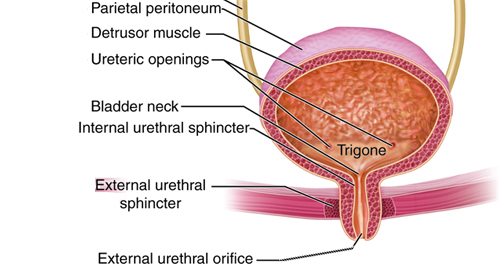Causes and Risk Factors of Bladder Pain Syndrome
The exact causes and risk factors of bladder pain syndrome (BPS) remains unclear. It is believed to be a complex, multifactorial condition, involving disruptions in the bladder lining, immune system responses, nerve hypersensitivity, and possibly even autoimmune factors.
Unlike a standard urinary infection, BPS does not involve bacteria. Instead, it may stem from inflammation and damage to the bladder lining (urothelium), allowing irritating substances in the urine to affect the deeper tissues of the bladder wall.
Theories behind BPS include:
- Bladder lining defect
- A compromised glycosaminoglycan (GAG) layer in the bladder allows toxins in urine to leak into deeper tissues, triggering inflammation and pain.
- A compromised glycosaminoglycan (GAG) layer in the bladder allows toxins in urine to leak into deeper tissues, triggering inflammation and pain.
- Nerve dysfunction
- Hypersensitive nerves may send pain signals even without a true injury.
- This overlaps with other pain syndromes like fibromyalgia or irritable bowel syndrome (IBS).
- Autoimmune component
- The immune system may mistakenly attack the bladder, leading to chronic inflammation.
- The immune system may mistakenly attack the bladder, leading to chronic inflammation.
- Mast cell activation
- These immune cells may release substances that irritate the bladder, particularly in response to allergens or stress.
- These immune cells may release substances that irritate the bladder, particularly in response to allergens or stress.
- Pelvic floor dysfunction
- Tight or overactive pelvic muscles can contribute to bladder pain.
- Tight or overactive pelvic muscles can contribute to bladder pain.
- Psychological stress
- While not the cause, stress is a known trigger for flares and can worsen symptoms.
Risk factors:
- Being female (up to 90% of cases occur in women)
- Age between 30 and 50
- Family history of BPS or chronic pain disorders
- Having other chronic conditions like IBS, endometriosis, or vulvodynia
- History of frequent UTIs or pelvic surgery
In South Africa, lack of access to specialist urologists and awareness among general practitioners means many people suffer for years without answers. Misdiagnosis is common — patients may be told they have recurrent UTIs or that the issue is “in their head.”
Causes and Risk Factors of Bladder Pain Syndrome
Understanding these possible causes helps both patients and healthcare providers move beyond symptom dismissal and toward multi-disciplinary, personalised care.
👉 [Next: Diagnosis and Tests for Bladder Pain Syndrome]


